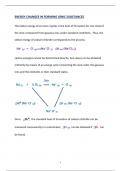Born haber cycle - Study guides, Class notes & Summaries
Looking for the best study guides, study notes and summaries about Born haber cycle? On this page you'll find 53 study documents about Born haber cycle.
Page 4 out of 53 results
Sort by
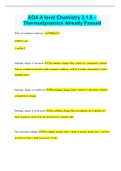
-
AQA A level Chemistry 3.1.8 – Thermodynamics Already Passed
- Exam (elaborations) • 7 pages • 2023
-
Available in package deal
-
- $9.99
- + learn more
AQA A level Chemistry 3.1.8 – Thermodynamics Already Passed What are standard conditions? 298K/25°C 100kPa/1 atm 1 moldm-3 Enthalpy change of formation The enthalpy change when 1 mole of a compound is formed from its constituent elements under standard conditions, with all reactants and products in their standard states. Enthalpy change of combustion The enthalpy change when 1 mole of a substance is burned completely in oxygen. Enthalpy change of atomisation The enthalpy change that accomp...
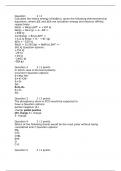
-
CHEM133 Week 16 Final Exam
- Exam (elaborations) • 11 pages • 2023
-
Available in package deal
-
- $45.96
- + learn more
1. Question: Calculate the lattice energy of NaBr(s), given the following thermochemical equations, where ΔIE and ΔEA are ionization energy and electron affinity, respectively. 2. Question: In which case is the bond polarity incorrect? 3. Question: The phosphorus atom in PCl3 would be expected to have a 4. Question: Which of the following bonds would be the most polar without being considered ionic? 5. Question: Calculate the standard enthalpy of formation (ΔHformation) for LiCl(s) given ...
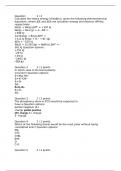
-
CHEM133 Week 16 Final Exam (Summer)
- Exam (elaborations) • 11 pages • 2023
-
- $24.49
- + learn more
1. Question: Calculate the lattice energy of NaBr(s), given the following thermochemical equations, where ΔIE and ΔEA are ionization energy and electron affinity, respectively. 2. Question: In which case is the bond polarity incorrect? 3. Question: The phosphorus atom in PCl3 would be expected to have a 4. Question: Which of the following bonds would be the most polar without being considered ionic? 5. Question: Calculate the standard enthalpy of formation (ΔHformation) for LiCl(s) given ...
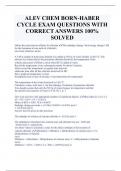
-
ALEV CHEM BORN-HABER CYCLE EXAM QUESTIONS WITH CORRECT ANSWERS 100% SOLVED
- Exam (elaborations) • 6 pages • 2024
-
- $8.49
- + learn more
ALEV CHEM BORN-HABER CYCLE EXAM QUESTIONS WITH CORRECT ANSWERS 100% SOLVED Define the term electron affinity for chlorine The enthalpy change / heat energy change / ΔH for the formation of one mole of (chloride) ions from (chlorine) atoms A 5.00 g sample of potassium chloride was added to 50.0 g of water initially at 20.0 °C. The mixture was stirred and as the potassium chloride dissolved, the temperature of the solution decreased. Start a clock when KCl is added to water Record ...
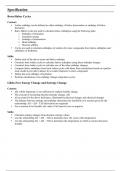
-
AQA A Level Chemistry - Unit 3.1.8: Thermodynamics - Full Notes
- Summary • 8 pages • 2023
-
- $5.32
- + learn more
Detailed and comprehensive notes on unit 3.1.8 (thermodynamics) for AQA A level chemistry. Covers: enthalpy change definitions, born haber cycles, the perfect ionic model, entropy, Gibb’s free energy, enthalpies of solution and feasibility.
This document gives details of how the Born Haber Cycle of Sodium Chloride can be calculated. It includes the drawing of the Born Haber Cycle and the lattice enthalpy of Sodium Chloride.

-
A* GRADE AQA A-Level Chemistry: Physical - Thermodynamics (3.1.8)
- Summary • 3 pages • 2023
-
Available in package deal
-
- $7.98
- + learn more
I achieved a high A* Grade in my final A-Level exams using these notes!!! I believe you can achieve an A* if you can memorise these notes! Simply use blurting, a method of active recall, to write everything you remember from the notes, then identify the parts you couldn’t remember, then repeat until you can remember it all! If you can do that, you’ve got an A* in the bag! They are clear, concise, and are laid out according to the specification; there is no information missing or in excess...
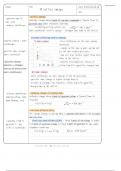
-
A Level Chemistry Chapter 19 Lattice Energy Detailed Summary Note
- Summary • 5 pages • 2024
-
- $7.32
- + learn more
A Level Chemistry Chapter 19 Lattice Energy Detailed Summary Note including the topics - factors affecting lattice energy, enthalpy change, electron affinity, born-haber cycle, ion polarisation, and solubility
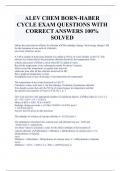
-
ALEV CHEM BORN-HABER CYCLE EXAM QUESTIONS WITH CORRECT ANSWERS 100% SOLVED
- Exam (elaborations) • 6 pages • 2024
-
- $7.99
- + learn more
ALEV CHEM BORN-HABER CYCLE EXAM QUESTIONS WITH CORRECT ANSWERS 100% SOLVED Define the term electron affinity for chlorine The enthalpy change / heat energy change / ΔH for the formation of one mole of (chloride) ions from (chlorine) atoms A 5.00 g sample of potassium chloride was added to 50.0 g of water initially at 20.0 °C. The mixture was stirred and as the potassium chloride dissolved, the temperature of the solution decreased. Start a clock when KCl is added to water Record ...
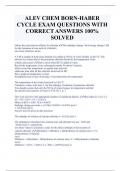
-
ALEV CHEM BORN-HABER CYCLE EXAM QUESTIONS WITH CORRECT ANSWERS 100% SOLVED
- Exam (elaborations) • 6 pages • 2024
-
- $7.99
- + learn more
ALEV CHEM BORN-HABER CYCLE EXAM QUESTIONS WITH CORRECT ANSWERS 100% SOLVED Define the term electron affinity for chlorine The enthalpy change / heat energy change / ΔH for the formation of one mole of (chloride) ions from (chlorine) atoms A 5.00 g sample of potassium chloride was added to 50.0 g of water initially at 20.0 °C. The mixture was stirred and as the potassium chloride dissolved, the temperature of the solution decreased. Start a clock when KCl is added to water Record ...

That summary you just bought made someone very happy. Also get paid weekly? Sell your study resources on Stuvia! Discover all about earning on Stuvia



